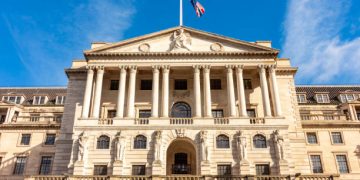LONDON — The Bank of England (BoE) lowered its key interest rate by 0.25 percentage points to 4 percent on Thursday, marking the lowest level in two and a half years. The move is aimed at supporting the UK economy amid ongoing uncertainty related to U.S. trade tariffs.
The central bank also revised its forecast for UK economic growth in 2025 to 1.25 percent, an improvement from its earlier estimate of 1 percent. While the BoE noted that the direct effects of the tariffs have been less severe than initially expected, it said that broader uncertainty linked to global trade policies continues to weigh on business sentiment.
Earlier this year, London and Washington reached an agreement to reduce certain U.S. tariffs — previously set at over 10 percent — on UK-made goods, particularly vehicles. The latest decision represents the BoE’s fifth rate cut since August 2024, part of an ongoing policy adjustment cycle.
Governor Andrew Bailey emphasized that while rates remain on a downward trajectory, any future reductions will be made cautiously. “Interest rates are still on a downward path, but any future rate cuts will need to be made gradually and carefully,” he said.
The rate decision passed by a narrow 5-4 vote following an unusual second round of voting — the first of its kind since the BoE gained independence in 1997. Initially, members were split between maintaining the current rate, reducing it by 0.25 percentage points, or implementing a larger 0.50-point cut. A change in one policymaker’s position ultimately broke the deadlock.
Market analysts now expect the rate to stand at 3.5 percent within the next year, slightly higher than previous projections. The decision has strengthened the British pound, reflecting expectations of a longer period at current rate levels.
The BoE’s inflation target is 2 percent, but the Consumer Prices Index reached 3.6 percent in June, its highest level in 18 months, driven by elevated fuel and food prices. The bank forecasts inflation will peak at 4 percent next month before easing.
The UK economy contracted for the second consecutive month in May, and unemployment has risen to 4.7 percent, its highest in nearly four years. Economists point to a combination of tariff pressures and higher domestic business taxes introduced in April as contributing factors to the slowdown.
#SupplyChainNews #EconomicIndicators #TradePolicies #TariffsAndDuties #GlobalMarkets

















